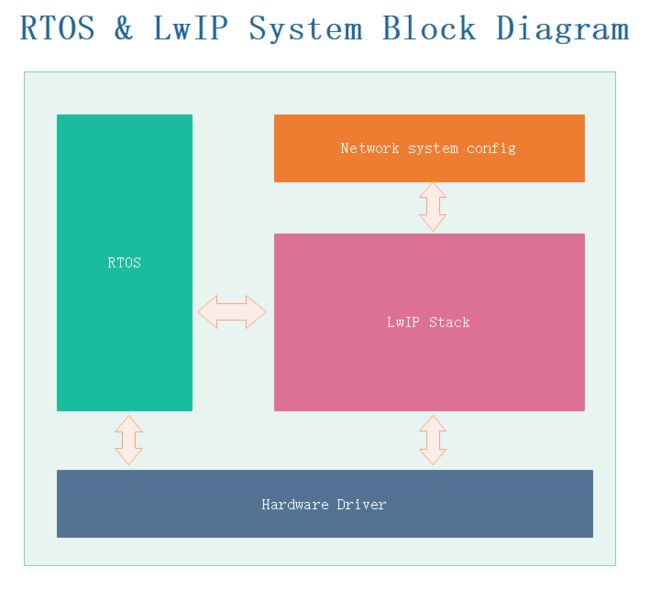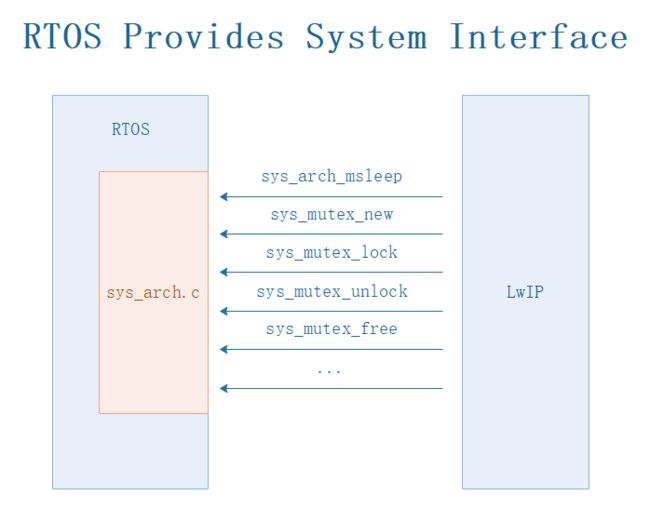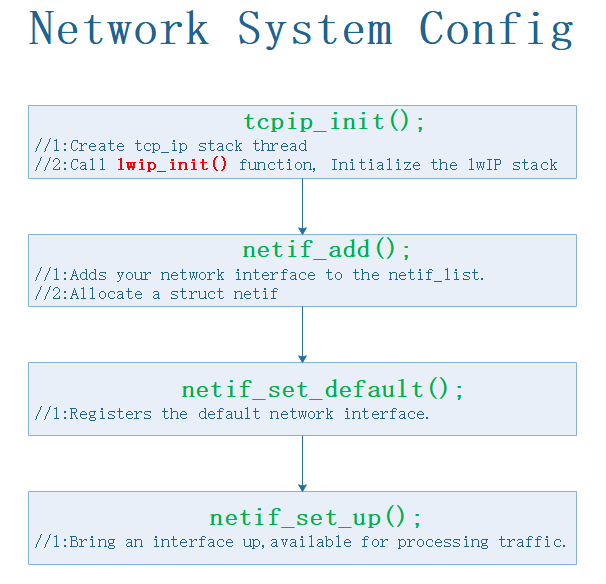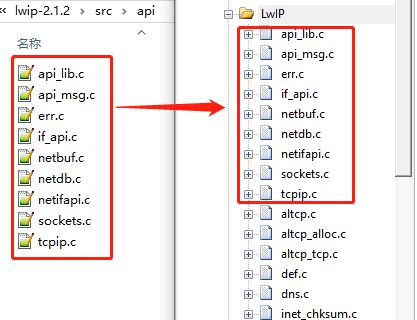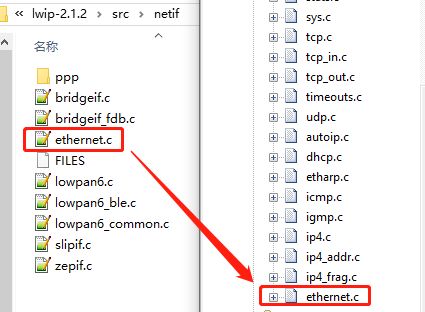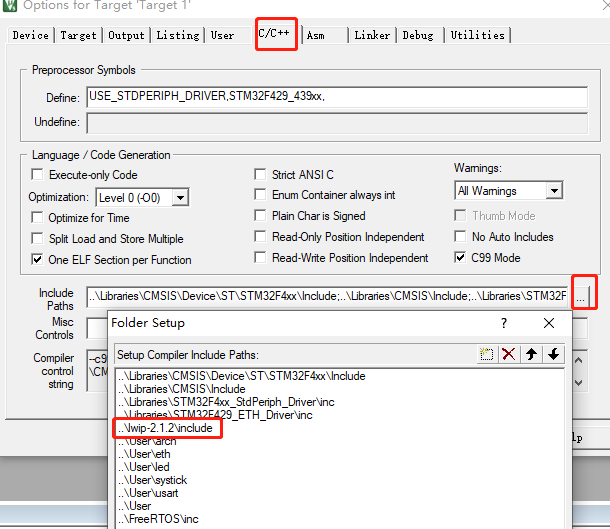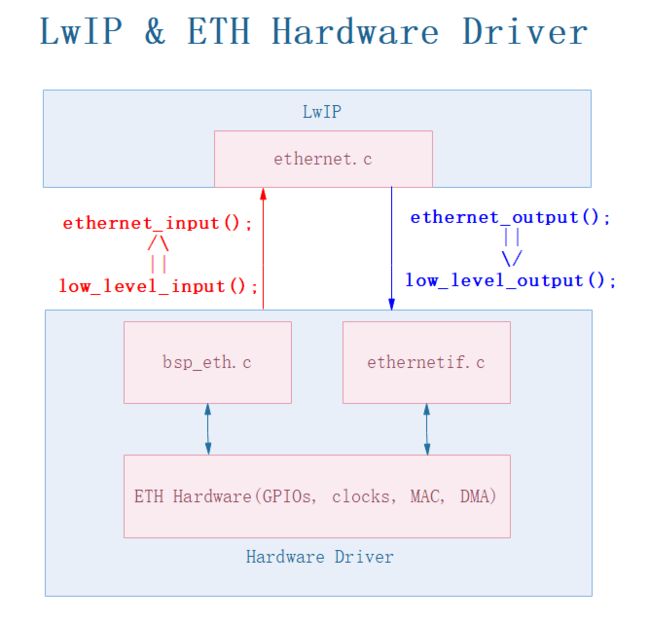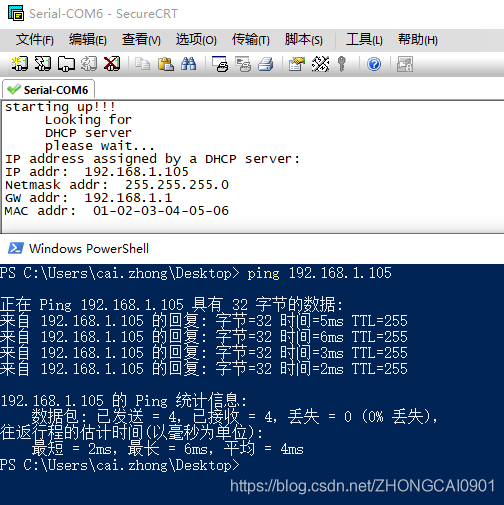【FreeRTOS】基于STM32移植LWIP 2.1.2详细步骤
文章目录
- 1. 前言
- 2. STM32运行LwIP的系统框图
- 3. LwIP RTOS部分的移植
- 4. LwIP System Config部分的移植
- 5. LwIP Stack部分的移植
- 6. LwIP Hardware Driver部分的移植
- 7. 验证测试
- 8. 资料下载地址
1. 前言
在STM32平台移植LWIP 2.1.2功能,首先需要做一些准备工作,例如:
- 下载资料:
lwip-2.1.2、contrib-2.1.0、STM32F4x7_ETH_LwIP_V1.1.1,参考:《基于STM32移植LWIP的资料准备》 - 准备好已经在STM32移植好的FreeRTOS的工程。
移植的目标平台是STM32F429,在以前资料准备中有提到STM32官网有STM32F4x7微控制器的LwIP TCP/IP协议栈的演示代码,我们在很大程度上可以参考移植到目标平台。
2. STM32运行LwIP的系统框图
我们在STM32平台上面移植LwIP,主要完成以下4个部分:
- RTOS:在STM32运行FreeRTOS,并且为LwIP协议栈提供
Mutex、Mail box和Create Thread等API接口。 - Network System Config:主要对LwIP协议栈的系统设置。
- LwIP Stack:这个是LwIP 2.1.2 TCP/IP协议栈,我们只需要将源码添加到工程即可。
- Hardware Driver:主要是STM32平台ETH接口的驱动层,例如:
GPIOs,clocks,MAC,DMA的设置。
这4个部分之间的联系框图如下:
3. LwIP RTOS部分的移植
在LwIP RTOS部分的移植我们可以参考contrib-2.1.0,这部分主要是为LwIP协议栈提供Mutex、Mail box和Create Thread等API接口。因为每个OS对这些API接口的具体实现都会有差异,所以LwIP官方提供了一个模板。正好contrib-2.1.0里面有提供FreeRTOS这些接口的实现,我们可以直接移植过来,代码路径如下:
PATH:contrib-2.1.0\ports\freertos\sys_arch.c
RTOS提供提供架构的接口,如下:
4. LwIP System Config部分的移植
在LwIP System Config部分的移植我们可以参考STM32F4x7_ETH_LwIP_V1.1.1(PATH: STM32F4x7_ETH_LwIP_V1.1.1\Project\FreeRTOS\udptcp_echo_server_netconn\src\netconf.c),主要的步骤如下:
- tcpip_init(): 主要是创建tcp_ip stack线程,并且调用
lwip_init()函数初始化LwIP协议栈。 - netif_add(): 申请一个
struct netif,设置默认的IP地址、子网掩码和网关,并且将其网络接口添加到netif_list。 - netif_set_default():注册新申请的网络接口为默认网络接口。
- netif_set_up():启动网络接口。
- dhcp_start():开始DHCP自动获取IP地址,如果设置默认IP地址,可不调用。(备注:非必须调用)
LwIP System Config还有一个更重要部分,就是LwIP系统选项配置的头文件lwipopts.h。我这里的配置如下:(仅供参考)
#ifndef __LWIPOPTS_H__
#define __LWIPOPTS_H__
/**
* SYS_LIGHTWEIGHT_PROT==1: if you want inter-task protection for certain
* critical regions during buffer allocation, deallocation and memory
* allocation and deallocation.
*/
#define SYS_LIGHTWEIGHT_PROT 0
#define ETHARP_TRUST_IP_MAC 0
#define IP_REASSEMBLY 0
#define IP_FRAG 0
#define ARP_QUEUEING 0
#define LWIP_IPV4 1
/**
* NO_SYS==1: Provides VERY minimal functionality. Otherwise,
* use lwIP facilities.
*/
#define NO_SYS 0
/* ---------- Memory options ---------- */
/* MEM_ALIGNMENT: should be set to the alignment of the CPU for which
lwIP is compiled. 4 byte alignment -> define MEM_ALIGNMENT to 4, 2
byte alignment -> define MEM_ALIGNMENT to 2. */
#define MEM_ALIGNMENT 4
/* MEM_SIZE: the size of the heap memory. If the application will send
a lot of data that needs to be copied, this should be set high. */
#define MEM_SIZE (5*1024)
/* MEMP_NUM_PBUF: the number of memp struct pbufs. If the application
sends a lot of data out of ROM (or other static memory), this
should be set high. */
#define MEMP_NUM_PBUF 100
/* MEMP_NUM_UDP_PCB: the number of UDP protocol control blocks. One
per active UDP "connection". */
#define MEMP_NUM_UDP_PCB 6
/* MEMP_NUM_TCP_PCB: the number of simulatenously active TCP
connections. */
#define MEMP_NUM_TCP_PCB 10
/* MEMP_NUM_TCP_PCB_LISTEN: the number of listening TCP
connections. */
#define MEMP_NUM_TCP_PCB_LISTEN 5
/* MEMP_NUM_TCP_SEG: the number of simultaneously queued TCP
segments. */
#define MEMP_NUM_TCP_SEG 20
/* MEMP_NUM_SYS_TIMEOUT: the number of simulateously active
timeouts. */
#define MEMP_NUM_SYS_TIMEOUT 10
/* ---------- Pbuf options ---------- */
/* PBUF_POOL_SIZE: the number of buffers in the pbuf pool. */
#define PBUF_POOL_SIZE 20
/* PBUF_POOL_BUFSIZE: the size of each pbuf in the pbuf pool. */
#define PBUF_POOL_BUFSIZE 500
/* ---------- TCP options ---------- */
#define LWIP_TCP 1
#define TCP_TTL 255
/* Controls if TCP should queue segments that arrive out of
order. Define to 0 if your device is low on memory. */
#define TCP_QUEUE_OOSEQ 0
/* TCP Maximum segment size. */
#define TCP_MSS (1500 - 40) /* TCP_MSS = (Ethernet MTU - IP header size - TCP header size) */
/* TCP sender buffer space (bytes). */
#define TCP_SND_BUF (5*TCP_MSS)
/* TCP_SND_QUEUELEN: TCP sender buffer space (pbufs). This must be at least
as much as (2 * TCP_SND_BUF/TCP_MSS) for things to work. */
#define TCP_SND_QUEUELEN (4* TCP_SND_BUF/TCP_MSS)
/* TCP receive window. */
#define TCP_WND (2*TCP_MSS)
/* ---------- ICMP options ---------- */
#define LWIP_ICMP 1
/* ---------- DHCP options ---------- */
/* Define LWIP_DHCP to 1 if you want DHCP configuration of
interfaces. DHCP is not implemented in lwIP 0.5.1, however, so
turning this on does currently not work. */
#define LWIP_DHCP 1
/* ---------- UDP options ---------- */
#define LWIP_UDP 1
#define UDP_TTL 255
/* ---------- Statistics options ---------- */
#define LWIP_STATS 0
#define LWIP_PROVIDE_ERRNO 1
/* ---------- link callback options ---------- */
/* LWIP_NETIF_LINK_CALLBACK==1: Support a callback function from an interface
* whenever the link changes (i.e., link down)
*/
#define LWIP_NETIF_LINK_CALLBACK 1
/*
--------------------------------------
---------- Checksum options ----------
--------------------------------------
*/
/*
The STM32F4x7 allows computing and verifying the IP, UDP, TCP and ICMP checksums by hardware:
- To use this feature let the following define uncommented.
- To disable it and process by CPU comment the the checksum.
*/
#define CHECKSUM_BY_HARDWARE
#ifdef CHECKSUM_BY_HARDWARE
/* CHECKSUM_GEN_IP==0: Generate checksums by hardware for outgoing IP packets.*/
#define CHECKSUM_GEN_IP 0
/* CHECKSUM_GEN_UDP==0: Generate checksums by hardware for outgoing UDP packets.*/
#define CHECKSUM_GEN_UDP 0
/* CHECKSUM_GEN_TCP==0: Generate checksums by hardware for outgoing TCP packets.*/
#define CHECKSUM_GEN_TCP 0
/* CHECKSUM_CHECK_IP==0: Check checksums by hardware for incoming IP packets.*/
#define CHECKSUM_CHECK_IP 0
/* CHECKSUM_CHECK_UDP==0: Check checksums by hardware for incoming UDP packets.*/
#define CHECKSUM_CHECK_UDP 0
/* CHECKSUM_CHECK_TCP==0: Check checksums by hardware for incoming TCP packets.*/
#define CHECKSUM_CHECK_TCP 0
/* CHECKSUM_CHECK_ICMP==0: Check checksums by hardware for incoming ICMP packets.*/
#define CHECKSUM_GEN_ICMP 0
#else
/* CHECKSUM_GEN_IP==1: Generate checksums in software for outgoing IP packets.*/
#define CHECKSUM_GEN_IP 1
/* CHECKSUM_GEN_UDP==1: Generate checksums in software for outgoing UDP packets.*/
#define CHECKSUM_GEN_UDP 1
/* CHECKSUM_GEN_TCP==1: Generate checksums in software for outgoing TCP packets.*/
#define CHECKSUM_GEN_TCP 1
/* CHECKSUM_CHECK_IP==1: Check checksums in software for incoming IP packets.*/
#define CHECKSUM_CHECK_IP 1
/* CHECKSUM_CHECK_UDP==1: Check checksums in software for incoming UDP packets.*/
#define CHECKSUM_CHECK_UDP 1
/* CHECKSUM_CHECK_TCP==1: Check checksums in software for incoming TCP packets.*/
#define CHECKSUM_CHECK_TCP 1
/* CHECKSUM_CHECK_ICMP==1: Check checksums by hardware for incoming ICMP packets.*/
#define CHECKSUM_GEN_ICMP 1
#endif
/*
----------------------------------------------
---------- Sequential layer options ----------
----------------------------------------------
*/
/**
* LWIP_NETCONN==1: Enable Netconn API (require to use api_lib.c)
*/
#define LWIP_NETCONN 1
/*
------------------------------------
---------- Socket options ----------
------------------------------------
*/
/**
* LWIP_SOCKET==1: Enable Socket API (require to use sockets.c)
*/
#define LWIP_SOCKET 0
/*
-----------------------------------
---------- DEBUG options ----------
-----------------------------------
*/
#define LWIP_DEBUG 0
/*
---------------------------------
---------- OS options ----------
---------------------------------
*/
#define TCPIP_THREAD_NAME "TCP/IP"
#define TCPIP_THREAD_STACKSIZE 1000
#define TCPIP_MBOX_SIZE 5
#define DEFAULT_UDP_RECVMBOX_SIZE 2000
#define DEFAULT_TCP_RECVMBOX_SIZE 2000
#define DEFAULT_ACCEPTMBOX_SIZE 2000
#define DEFAULT_THREAD_STACKSIZE 500
#define TCPIP_THREAD_PRIO 3
//#define LWIP_COMPAT_MUTEX 1
#endif /* __LWIPOPTS_H__ */
5. LwIP Stack部分的移植
- 将LwIP 2.1.2的源码添加到工程,分别为
api、core、netif,详细如下:
- 将LwIP 2.1.2的头文件路径添加到Keil:
6. LwIP Hardware Driver部分的移植
LwIP Hardware Driver部分的移植主要是2个文件,如下:
- bsp_eth.c: 主要是设置Ethernet的GPIOs, clocks, MAC, DMA,参考:
STM32F4x7_ETH_LwIP_V1.1.1\Project\FreeRTOS\udptcp_echo_server_netconn\src\stm32f4x7_eth_bsp.c - ethernetif.c: 主要是创建了一个
ETH_MAC线程,读取以太网的消息。low_level_input收到消息后,然后通过call back调用ethernet_input传递到LwIP层去解析。如果LwIP层有消息需要发送,就通过ethernet_output调用ETH Hardware Driver层的low_level_output发送出去。参考:STM32F4x7_ETH_LwIP_V1.1.1\Utilities\Third_Party\lwip-1.4.1\port\STM32F4x7\FreeRTOS\ethernetif.c
7. 验证测试
8. 资料下载地址
移植成功的完整代码下载地址如下:
https://download.csdn.net/download/ZHONGCAI0901/13100126
